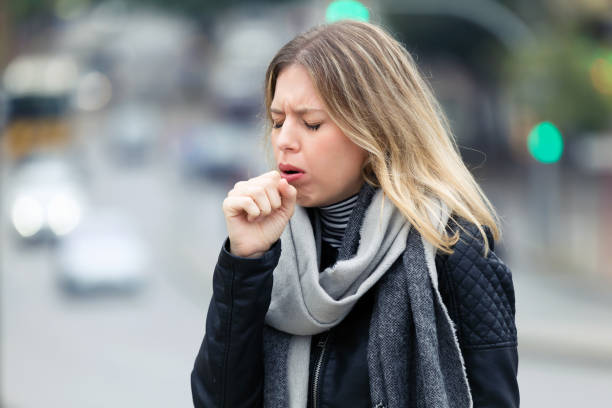Allergy coughing can be an irritating and disruptive symptom triggered by allergens like pollen, dust mites, pet dander, or mold. For many, it leads to restless nights, disrupted focus, and overall discomfort. Thankfully, understanding the root cause and using effective strategies can help stop allergy coughing fast and reclaim your comfort.
 Understanding Allergy Coughing
Understanding Allergy Coughing
Before diving into solutions, it’s essential to understand what allergy coughing is and why it occurs. When the body encounters an allergen, the immune system reacts by releasing histamines, which can lead to inflammation and irritation in the respiratory tract. This reaction is part of the body's defense mechanism, aiming to expel harmful substances. However, in the case of allergens, this response can become exaggerated, resulting in discomfort and persistent coughing.
What Causes Allergy Coughing?
Allergy coughing is primarily caused by the body's response to allergens. Common triggers include:
Pollen from trees, grasses, and weeds
Dust mites found in bedding and upholstery
Pet dander from cats and dogs
Mold spores in damp environments
When these allergens enter the airways, they can cause the throat and lungs to become irritated, leading to a persistent cough. Additionally, environmental factors such as changes in weather, air pollution, and even strong odors can exacerbate these symptoms. For instance, during the spring season, pollen counts can soar, making it a particularly challenging time for allergy sufferers. Understanding the specific triggers can help individuals take proactive measures to minimize exposure.
Symptoms of Allergy Coughing
Allergy coughing can manifest in various ways, including:
Recognizing these symptoms is crucial for effective management and treatment. In some cases, allergy coughing may be accompanied by other allergic reactions, such as skin rashes or gastrointestinal disturbances, further complicating the picture. It’s important to note that while allergy coughing is often benign, it can mimic other respiratory conditions like asthma or bronchitis. Therefore, keeping a detailed record of symptoms and potential triggers can be invaluable for healthcare providers in diagnosing and recommending appropriate treatment strategies.
Immediate Relief Strategies
When faced with an allergy cough, immediate relief is often sought. Here are several strategies to consider:
Stay Hydrated
Drinking water and warm beverages such as herbal teas can help soothe the throat, reduce irritation, and thin mucus. Adding honey to warm drinks may provide additional relief.
Use a Humidifier
Dry indoor air can worsen throat irritation. A humidifier adds moisture to the air, which can reduce coughing, especially during colder months when heating systems dry out the air.
Gargle with Salt Water
Gargling with warm salt water can reduce inflammation and help remove irritants. This remedy is simple but effective in easing throat discomfort and decreasing cough frequency.
Over-the-Counter Medications
For more persistent allergy coughing, over-the-counter medications can provide significant relief. Here are some options:
Antihistamines
Antihistamines work by blocking the action of histamines, which are responsible for allergy symptoms. Popular options include:
These medications can help reduce coughing by alleviating other allergy symptoms, such as nasal congestion and post-nasal drip. It's important to note that while some antihistamines are non-drowsy, others, like diphenhydramine, may cause sedation. Therefore, if you're planning to drive or operate machinery, it's wise to choose a non-drowsy option. Additionally, antihistamines can sometimes lead to dry mouth or dizziness, so staying hydrated is essential while using these medications.
Cough Suppressants
Medications containing dextromethorphan can reduce the urge to cough. These are most effective for dry, non-productive coughs. However, if mucus is present, suppressants may hinder the body’s ability to clear it from the airways.
Always consult with a healthcare provider or use a digital wellness tool such as Doctronic.ai before combining medications or beginning new treatment regimens.
Home Remedies for Allergy Coughing
In addition to medications, various home remedies can help alleviate allergy coughing:
Honey and Lemon
A mixture of honey and lemon in warm water can soothe an irritated throat. Honey has natural antibacterial properties, while lemon can help cut through mucus. This soothing concoction not only provides relief but also enhances hydration, which is crucial when dealing with a persistent cough. The warmth of the water helps to relax the throat muscles, making it easier to swallow and reducing the urge to cough. Additionally, honey can coat the throat, offering a protective barrier against irritants that may trigger further coughing.
Ginger Tea
Ginger is known for its anti-inflammatory properties. Drinking ginger tea can help reduce throat irritation and may provide relief from coughing. Beyond its soothing effects, ginger also boosts the immune system, which can be particularly beneficial during allergy season. By incorporating ginger into your daily routine, you may find that not only does it ease your cough, but it also helps to fend off other respiratory issues. To enhance the benefits, consider adding a pinch of turmeric to your ginger tea; this powerful combination can amplify the anti-inflammatory effects, providing even greater comfort for those suffering from allergy-induced symptoms.
Environmental Control
Reducing exposure to allergens is crucial in managing allergy coughing. Here are some effective strategies:
Keep Indoor Air Clean
Using air purifiers with HEPA filters can significantly reduce airborne allergens in the home. Regularly changing HVAC filters and ensuring proper ventilation can also help maintain clean air. Additionally, incorporating houseplants that naturally purify the air, such as spider plants or peace lilies, can enhance indoor air quality. However, it's essential to choose plants that do not produce excessive pollen, as this could counteract your efforts to reduce allergens.
Regular Cleaning
Frequent cleaning can minimize dust and dander. Consider the following:
Vacuum carpets and upholstery regularly using a vacuum with a HEPA filter.
Wash bedding in hot water weekly to eliminate dust mites.
Dust surfaces with a damp cloth to avoid stirring up allergens.
In addition to these cleaning practices, it’s beneficial to declutter your living space. Reducing the number of knick-knacks, books, and other items that can collect dust will not only make cleaning easier but also create a more serene environment. Furthermore, consider using allergen-proof covers on pillows and mattresses, which can provide an additional layer of protection against dust mites and other allergens. These simple adjustments can contribute significantly to a healthier indoor atmosphere, making it easier for allergy sufferers to breathe comfortably.
When to Seek Medical Attention
While many cases of allergy coughing can be managed at home, there are instances when medical attention is necessary. Signs that warrant a visit to a healthcare professional include:
Persistent Symptoms
If coughing persists despite home care or over-the-counter medications, consult a healthcare provider. Chronic coughing may be linked to asthma, bronchitis, or other respiratory conditions.
Severe Allergic Reactions
If symptoms include difficulty breathing, throat swelling, or a rapid heartbeat, seek immediate medical attention. These may indicate anaphylaxis, a life-threatening allergic reaction.
Other Warning Signs
Symptoms such as fever, unexplained weight loss, or coughing up blood may signal a more serious condition and should be evaluated by a medical professional.
For ongoing support, consider using Doctronic.ai to monitor symptoms and receive personalized guidance.
Long-Term Management of Allergies
For those with chronic allergies, long-term management strategies can help reduce the frequency and severity of allergy coughing:
Allergy Testing
Consulting an allergist for testing can help identify specific triggers. Once identified, individuals can take steps to avoid these allergens, leading to a reduction in symptoms. Allergy testing typically involves skin prick tests or blood tests, which can pinpoint common culprits such as pollen, dust mites, pet dander, and certain foods. Understanding these triggers not only empowers patients to make informed lifestyle choices but also aids in the development of personalized management plans that can significantly enhance their quality of life.
Immunotherapy
Immunotherapy, including allergy shots and sublingual tablets (SLIT), can help desensitize the immune system to specific allergens, offering long-term relief from symptoms like coughing. SLIT, taken under the tongue, provides a convenient alternative to injections and has shown promising results.
Complementary strategies such as keeping indoor environments clean, washing bedding in hot water, using air purifiers, and closing windows during high pollen seasons can further reduce allergen exposure. Additionally, a healthy lifestyle—including a diet rich in antioxidants and omega-3s, regular hydration, and physical activity—can strengthen the immune system and support respiratory health.
Diet and Lifestyle Changes
Making certain dietary and lifestyle adjustments can also play a role in managing allergies:
Anti-Inflammatory Diet
Incorporating anti-inflammatory foods, such as fruits, vegetables, and omega-3 fatty acids, can support overall health and may help reduce allergy symptoms. Foods rich in antioxidants can also bolster the immune system. For instance, berries, leafy greens, and fatty fish like salmon are excellent choices that not only provide essential nutrients but also help combat inflammation in the body. Additionally, spices such as turmeric and ginger have been shown to possess anti-inflammatory properties, making them ideal additions to meals. By focusing on a colorful plate filled with a variety of these foods, individuals can create a robust defense against the triggers of allergic reactions.
Regular Exercise
Engaging in regular physical activity can improve lung function and overall respiratory health. However, it’s essential to exercise indoors during high pollen seasons to avoid triggering allergies. Activities like yoga and swimming can be particularly beneficial, as they promote deep breathing and help maintain lung capacity. Furthermore, maintaining a consistent exercise routine can enhance your body’s resilience to allergens by improving circulation and reducing stress levels, which are known to exacerbate allergy symptoms. Finding a balance between outdoor activities and indoor workouts can help individuals stay active while minimizing exposure to allergens.
 A Smarter Way to Breathe Easier
A Smarter Way to Breathe Easier
While allergy coughing can be persistent and frustrating, it is manageable with the right combination of immediate relief measures and long-term strategies. By understanding your triggers, maintaining a clean environment, and using evidence-based approaches—from medications to lifestyle adjustments—you can take control of your symptoms.
For intelligent, personalized support, Doctronic.ai offers tools and insights to help you manage allergy symptoms more effectively. Use it to track patterns, get expert-backed advice, and enhance your overall respiratory wellness.



 Understanding Allergy Coughing
Understanding Allergy Coughing A Smarter Way to Breathe Easier
A Smarter Way to Breathe Easier